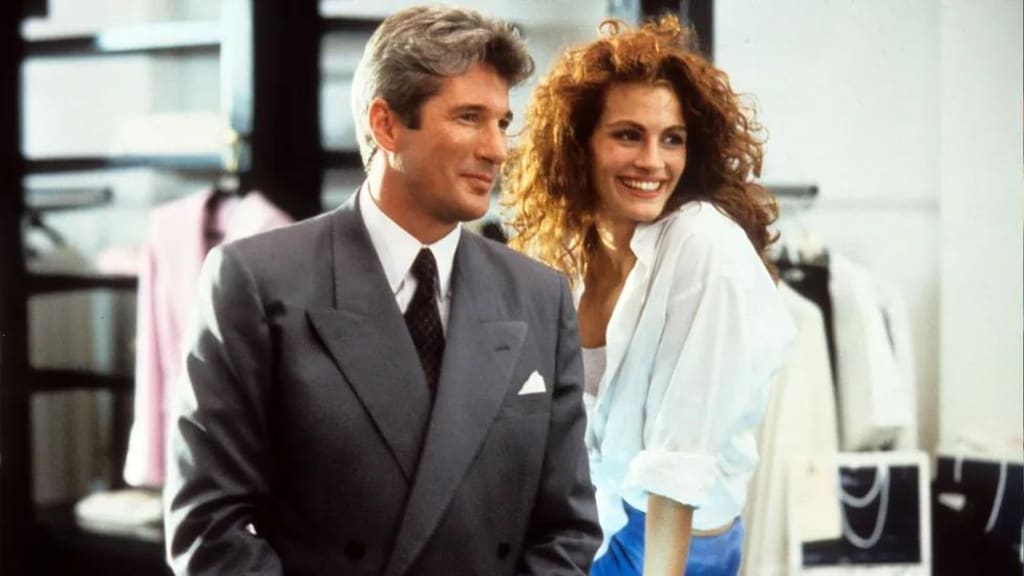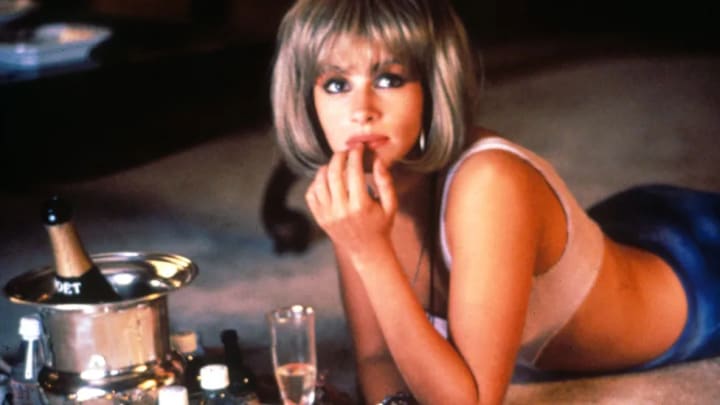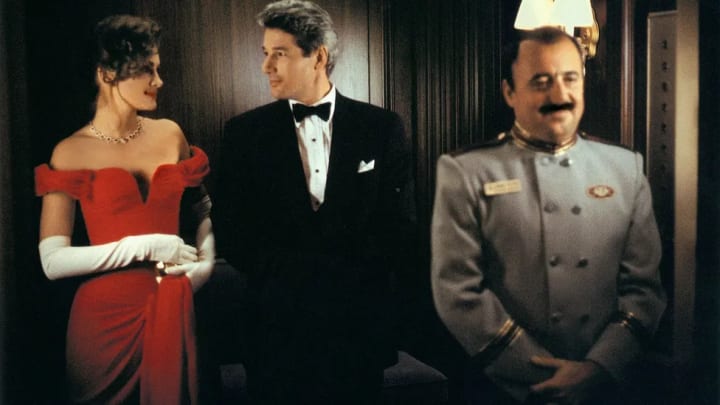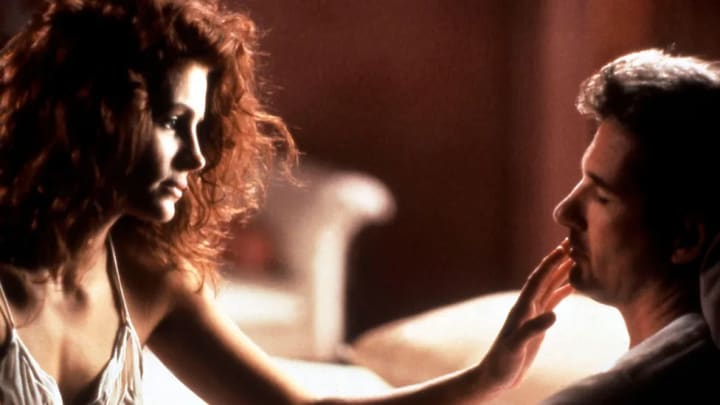How Pretty Woman erased sex from its story
As this hugely popular romantic comedy turns 30, why is a dark and brooding story about sex and drugs so heavily sanitized.

A middle-aged businessman pays a much-younger prostitute to be his live-in lover for a week. It’s a sordid premise for a feel-good romantic comedy, but that didn’t stop Pretty Woman being one of the biggest hits of 1990. And now, 30 years later, the film is still so cherished that a musical adaptation opened in London’s West End, after a successful run on Broadway (now closed due to the Coronavirus crisis). How did the film’s director, Garry Marshall, get away with it? How did he make such a tasteless exploitation fantasy seem almost wholesome? Well, casting a star with the incandescent beauty and charm of Julia Roberts was undoubtedly a factor. But another factor was casting a co-star, Richard Gere, who behaved as if that beauty and charm meant nothing to him.
Marshall sanitised the film’s plot in all sorts of ways. The original screenplay, written by JF Lawton, was a gloomier and grittier affair entitled 3,000, but by the time it had been made over as Pretty Woman – much as its heroine is made over on screen – it had far less swearing and drug use. The really crafty change, though, was that Gere’s character was far less enthusiastic about sleeping with Roberts’, thus shifting the story towards his melting heart, and away from any organs further down his body.

This crucial refinement becomes obvious when you read Lawton’s draft of the screenplay. The outline is the same: a New York fat cat named Edward hires a prostitute named Vivian to be his companion while he’s in Los Angeles, introducing her to the finer things in life in the process. But in 3,000, Edward (“in his late-forties”) picks up the crack-addicted Vivian on Hollywood Boulevard for the usual reasons, having appraised her “as if studying a label on a bottle of wine”. Back in his penthouse suite, she is naked within minutes, and their subsequent arrangement doesn’t focus on Vivian’s role as Edward’s arm candy; it focuses on sex. “I’m involved in an important business deal,” he oozes, “and I’m not going to have the energy to try to chase down girls when I need to relax.”
It’s all right, Marshall is telling us. You don’t have to worry about anything as seedy as a rich man paying a poor girl for sex
Several rewrites later, Edward has his mind on higher things. In Pretty Woman, he doesn’t pick up Vivian because he needs to “relax”, but because he needs directions back to the Beverly Wilshire hotel. It’s only when they arrive that he decides to invite her in, and even then he isn’t sure why. “Well, now that you have me here, what are you going to do with me,” prompts Vivian. “You wanna know something, I don’t have a clue,” moans her nervous host, sounding less like a Wall Street master of the universe than a virginal nerd in a high-school comedy. Vivian then takes the initiative, but Edward backs away, pleading: “Why don’t we just talk for a little bit, OK?” This attack of performance anxiety or scruples or whatever it might be carries on for quite some time. Whenever Vivian mentions what prostitutes actually do for a living, Edward sighs, winces or laughs in embarrassment, as if he’d rather be anywhere in the world except a luxury hotel suite with a woman who is significantly more than “pretty”.

There are faint echoes of Marilyn Monroe’s Sugar trying to stimulate Tony Curtis’s Joe in Some Like It Hot, the difference being that the disguised Joe is feigning impotence as a seduction ploy. Edward appears to be genuinely scared of getting between the sheets with Vivian; the film might as well have been called Some Like It Cold. And it is this ingenious addition to Lawton’s screenplay which allows Pretty Woman to float like a champagne bubble up from the squalor of its opening scenes to the wish-fulfilment of its second act. It’s all right, Marshall is telling us. You don’t have to worry about anything as seedy as a rich man paying a poor girl for sex. Look! The guy doesn’t even want to have sex with her! Pretty Woman makes this clear. When Vivian does eventually get her hands on Edward, he responds with a sharp intake of breath and a pained, faraway look. Marshall then cuts to his hot post-coital shower, as if he and the viewer were washing away a shameful memory.
Happily ever after?
Set all that next to the previous year’s hit US rom-com, When Harry Met Sally, in which the characters breezily recount their intimate liaisons. Set it next to the erotic heat in any pairing of Rock Hudson and Doris Day, or Spencer Tracy and Katharine Hepburn. Pretty Woman is positively prudish in comparison: a film about a sex worker which is primly censorious about casual sex. After dinner on their second evening together, Edward feels the “need to relax”, as his counterpart in 3,000 puts it. Vivian’s suggestion is that they “watch old movies all night”; Edward’s preferred alternative is to slope off to the hotel’s dining room and improvise moodily on the piano. By the third evening, the relationship seems to be warming up: Vivian is wearing nothing but a tie when Edward gets back from the office, and they retire to the penthouse’s boating pond-sized bath. Time for some smoky jazz saxophone and candle-lit canoodling? Well, no. Edward takes the opportunity to discuss the issues he had with his late father. Form a queue, ladies!
The only unambiguous bedroom scene is placed near the end of the film, after Vivian and Edward have fallen in love and been redeemed by each other
Of course, we understand that he is getting more for his money than therapeutic conversation, but the film skips past the sex so nimbly that we can pretend that he and Vivian are as chaste as Henry Higgins and Eliza Doolittle in the play which Pretty Woman updates, George Bernard Shaw’s Pygmalion. Gere’s air of distracted melancholy is key. How many other actors could be so convincingly unaroused by their statuesque leading lady? But Roberts’ goofiness is vital, too: she can sing along to a Prince song in a bubble bath and the effect is to show how gauche her character is. (At times, this aspect of Vivian is taken way too far. When she complains that Rodeo Drive’s snooty shop assistants “were mean to me” and that she enjoyed an opera so much “I almost peed my pants”, the father-daughter vibes are horribly reminiscent of Moze and Addie in Paper Moon, or even Humbert Humbert and Dolores Haze in Lolita.) There is also the audacious tactic of having Vivian and Edward being furious whenever someone refers to them as a “hooker” and a “trick”. It makes no sense, but because they are outraged by these labels, the viewer can be outraged, too.

The only unambiguous bedroom scene is placed near the end of the film, after Vivian and Edward have fallen in love and been redeemed by each other. Significantly, this sequence begins as Vivian wakes up the snoozing Edward with a kiss. Marshall once likened Pretty Woman to Rapunzel, and Vivian’s friend Kit (Laura San Giacomo) namechecks “Cinde-fuckin’-rella”, but at this point the film is a gender-swapped Sleeping Beauty. Whichever fairy tale you choose, though, it is definitely a fairy tale – and that means that its prince and princess can’t convey any passion until we know that they are going to live happily after.
As contrived as all the coyness may be, you have to respect how cleverly Marshall and his team pulled off a feat which should have been impossible. They cast America’s sweetheart as a prostitute alongside the actor who played a male escort in American Gigolo. And yet the resulting film was produced by Walt Disney, and it was a box-office smash during the era of Aids panic and Reagan-Bush conservatism. What’s more, its influence still lingers. Both Twilight (featuring another Edward) and its unauthorised spin-off, Fifty Shades of Grey (featuring another high-finance tycoon) take brief tourist trips to steamy and transgressive territory, then run back to the socially sanctioned security of abstinence, commitment, and very wealthy men. They do what Pretty Woman did, which is to let the viewer have their room-service strawberries and eat them, too. We get the titillating naughtiness of an Amazon in thigh-high boots boasting that she will do anything a man desires. But we also get the reassurance that, deep down, the characters’ connection is more spiritual than physical. Vivian talks a lot about safe sex, and that’s what Pretty Woman is selling: sex which is utterly safe.
About the Creator
Cindy Dory
When you think, act like a wise man; but when you speak, act like a common man.






Comments
There are no comments for this story
Be the first to respond and start the conversation.